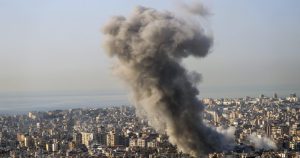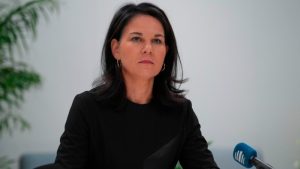what happened when the Taliban returned
I was at home in Kabul when the Taliban reseized power on August 15 2021. The morning began like any other. I sent my son, Siawash, who was then seven years old, to school. I sat down to work on a collection of short stories I hoped to publish in Afghanistan.
By mid-afternoon, the Taliban had entered Kabul, and the president had fled the country. By the end of the day, there was no government left.
I went outside to check if what I was seeing on Facebook and TV — people running in panic in every direction, shouting “Talib! Talib!” — was actually happening. It was hard to believe that the same Taliban ousted from their seat of power two decades ago had returned. But they were there, out on the street. They wore kohl eyeliner, shoulder-length hair and white sneakers.
In that instant, we transitioned from a period of democracy to one of repression. The streets became eerily empty of both men and women. A few days later, the men began to reappear, but women were rarely seen.
My parents travelled hundreds of kilometres from Herat to Kabul amid the upheaval. They were concerned for my safety. For the past 20 years, I had been speaking out against the Taliban, writing books and articles criticising them and advocating for equal rights for men and women. And in the Taliban’s warped logic, a divorced woman was expected to remarry swiftly. I had given them plenty of reasons to want to harm me. My father urged me to leave the country. And so, 13 days after the fall of Kabul, while I was sautéing onions in the kitchen to make mash palaw, a mung bean pilau rice dish, I received a call from a US diplomat saying, “It’s time to come to the airport. I can help you leave Kabul.”
Siawash and I fled. My mother’s silent tears fell like gentle rain as I said goodbye to her and my siblings. In those last moments, my father, a pillar of strength, held me tightly and urged Siawash to continue his studies. He was relieved that I was escaping. He had often warned me, “If you stay here, you’ll either end up in prison or the Taliban will force you to be silent like a wall.”




Every day since that August three years ago, I have started my day by reading news reports from Afghanistan. Women and girls over the age of 12 have been banned from attending school, working most jobs or appearing on TV. They must be “chaperoned” when travelling more than 72km. In the latest decree from the Taliban’s “Ministry for Propagation of Virtue and Prevention of Vice”, women’s voices and faces have been forbidden from being heard or seen outside their homes.
The Taliban continue to use corporal punishment against the population; last year they carried out hundreds of floggings for crimes including adultery, sodomy and theft. I also learnt that my brother, Khaled, had been imprisoned and tortured for a year. He had been accused of spreading propaganda against the Taliban through the media.
In our new home in New Haven, we are safe, but Siawash and I think about our country every day. When he goes to school, I call my cousin, Liba, who is 22 and still lives in Herat, to hear how things are.



Liba was a medical student when the Taliban took power in Herat in 2021. One year later, they banned women from university, sending security forces to campuses to stop them from entering. For three years now, she has stayed at home doing nothing. She tells me that sometimes she puts on her burka and goes to the university site to see the building. She misses everything about it. Her heart is full of sorrow. “The house has become our prison,” she said. “The walls seem to reach the sky, wrapping around my throat like a rope, choking me. It feels like someone has hung me from the highest wall in the world.”
Liba was born into the presidential republic, which was in power from 2004 to 2021, and knew the Taliban only from the stories we told her. She asked how we endured those years when the Taliban were last in power and they denied women the right to education and work. I tried to reassure her, saying, “Liba, this darkness will eventually lead to light. You will go back to university and become a doctor.” Then I say to her, out loud, “Dr Liba.” I don’t tell her that many of my friends self-immolated in Herat between 1996 and 2001, nor that many girls in the city did not survive. I do not want to take away any hope she has and, with it, her strength.
Though I’ve left the country, I fear the reaches of the Taliban. Last December, I received a text message from my uncle, who lives two storeys down from the apartment I keep in Kabul. He told me that a group of Taliban fighters had stormed my home. “They tore through the bookshelves and upended the closets, leaving your clothes in disarray,” he wrote. “They told me they knew who you were.” In the end, they took a pair of binoculars from my son’s toy room and left.
I have experience that reassures me these dark days will pass. We will find ways to fight back. Looking at Hashem Shakeri’s photographs, which show how women and minorities have been impacted by the regime, my eye is drawn to one in particular. Zahra Ebrahimi, a 12-year-old girl, stands at a window and stares out. Her face is not visible. A few yellow grapevine leaves grow across the windowsill. It makes my heart tremble; I remember feeling the same way, alone and hopeless. I try to see her eyes, but I can’t. I place my hand on her face as if to caress her. My fingertips are cold. I say, “Zahra, we will find a way to resist.”
About the photography
Photographer Hashem Shakeri has recently spent months working in Afghanistan, documenting daily life as the country readjusts to the Taliban’s return to power. His exhibition ‘Staring into the Abyss’ is produced in collaboration with Bristol Museum & Art Gallery, where it is on show from October 18 to January 12 2025, as part of the Bristol Photo Festival
Homeira Qaderi is an Afghan writer, activist and educator. Her latest book “Dancing in the Mosque: An Afghan Mother’s Letter to Her Son” is published by 4th Estate
Follow @FTMag to find out about our latest stories first and subscribe to our podcast Life and Art wherever you listen
#happened #Taliban #returned




